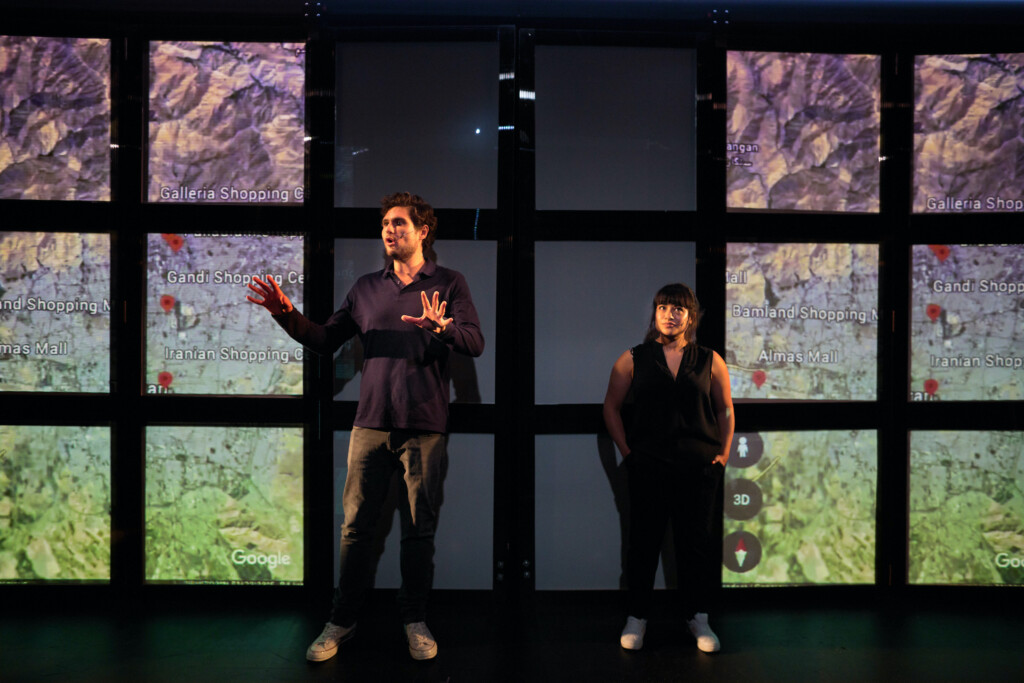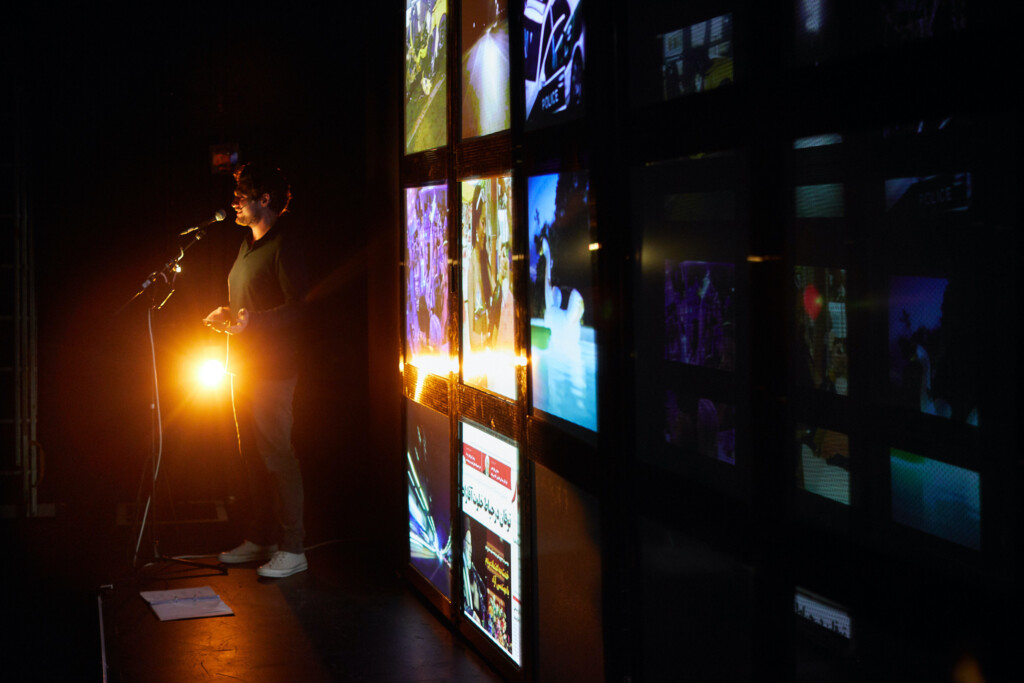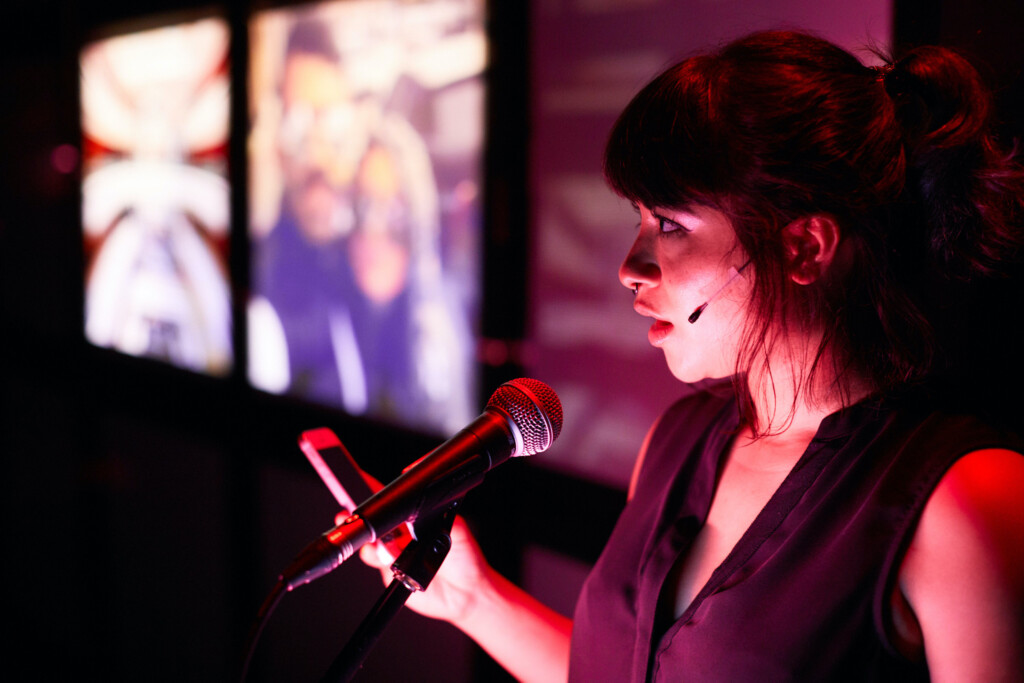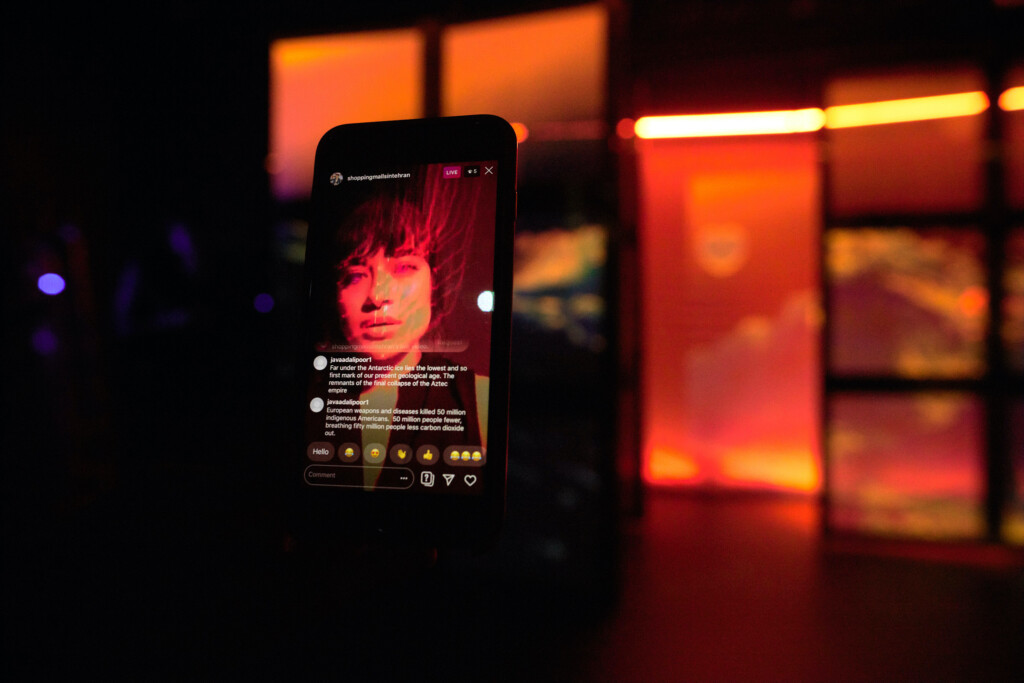Consumerism always trumps political ideology. Making the argument against it appears to be more difficult than ever.
In the digital version of the award-winning multimedia theatrical piece, Rich Kids: A History of Shopping Malls in Tehran, which was presented this year in Sundance’s New Frontier platform, the fascinating post-mortem begins with details of an actual fatal auto accident in 2015 on the streets of Tehran and then moves in reverse on a timeline that accelerates as its reaches farther back in history. Rich Kids is cogent, well-researched political theater, created by Javaad Alipoor and Kirsty Housley and performed by Alipoor and Peyvand Sadeghian.
The show, which premiered in 2019 and won a Scotsman Fringe First Award, is part of a trilogy in which Alipoor explores the role of how technology is widening and accelerating the split in human society and civilization. The final installment is expected to premiere in 2022. In this second installment, Rich Kids starts with the details of the crash of a Porsche Boxer GTS on Shariati Boulevard in Tehran, killing two people in their twenties. Parivash Akbarzadeh, who was driving the car and lost control as the car slammed into a tree, came from a middle-class background and enjoyed the attention she received on social media because of her beauty. The other fatality was Mohammad Hossein Rabbani-Shirazi, the rich grandson of a leading ayatollah in Iran’s government. Not helping matters, the young man was cheating on his fiancée, who was not Parivash – a clear affront to the Islamic code of morals and laws. The accident electrified a discussion about the reckless blend of double standards represented in this crash, which included cold, unsympathetic comments and messages being posted on the social media accounts of the two young Iranians.

In an interview with The Utah Review, Alipoor, who has Iranian roots and lives and works in the U.K., explains that playing with the concept of political art in the theatrical setting allows him to remodel the form and “break up the homogeneity of time.” He is variously motivated by diverse influences, including classic Shakespearean characters as well as the sons of the fictional Corleone family in The Godfather, along with Vaclav Havel, the playwright and dissident who later became president of the Czech Republic, and Italian writer Robert Saviano. The story of the fatal car crash emphasizes another point, to which Alipoor alludes. Displaying wealth can lead to political suicide in a country such as Iran. “It’s important to show that you’re one of the people as a sign of the legitimacy of the state and the fact that there was a revolution,” he adds.
Rich Kids was well suited to Sundance’s all-virtual platform this year. Viewers logged in to watch the live YouTube performance and were instructed to follow the show’s Instagram account, which included several live feed segments between sections of the 65-minute show. The whole effect was an innovative form of documentary theater, which upends many traditional conventions of stage shows. In 2017, when Alipoor premiered The Believers Are But Brothers, a show about the influences and effects of online radicalism for young men, the live multimedia stage performance included audience members logging into an encrypted group messaging and chat service. Instead of being directed to turn off all electronic devices, audience members are instructed to have them on for the purpose of the show. “Instagram becomes a metaphor for this show,” Alipoor adds.

In Rich Kids, viewers see images of partying, drinking, club hopping, drug use, high-end malls, luxury hotels and other signs of over-the-top ostentatiousness. As the timeline shifts into reverse, the events leading up to the accident are told first hours apart and quickly accelerate to points marking weeks, months and years. Then, the chronicle accelerates yet further, moving back to the time of the Islamic revolution in 1979, the final years of the Shah’s regime and Rabbani-Shirazi’s grandfather activism as an anti-monarchist. Near the end, we’re millennia away from 2015, touching on the archaeological remains of ancient civilizations. The discovery of Göbekli Tepe, long before Stonehenge was built, also has upended earlier contentions about the development of agriculture and civilization. It appears that the cultivation of fermented beverages preceded the development of agriculture. In other words, beer likely became the universal medicinal of choice for the hunter-gatherers (and stargazers) of the era. It is an assortment of international scientists who contend that the Holocene Epoch, which began some 12,000 years ago after the last of the Ice Age glaciers retreated, gave way to the Anthropocene Epoch in the middle of the last century. In the process of reengineering the planet for the sake of profit and wealth, we are also killing the spirit of human existence.
As for shopping malls, will their ruins be the evidence of our contemporary civilization, along with the discarded mountains of electronic and digital devices that defy biodegradability? Even in the heart of Islamic governance, the proliferation of upscale shopping malls boggles our preconceptions, as shown in Rich Kids. The mall names ironically reference the civilization pillars of Persian history. Everything is commodified and commercialized as priority.

Watching Rich Kids, I was reminded of the utter trash of the Bravo cable network’s reality series celebrating the crude displays of wealth. At one time Bravo was a platform for cultural programming but as social media turned the progeny of wealthy families into photogenic influencers without much else to offer, the network caved into a tedious format. Ironically, one of the series was the Shahs of Sunset, an epitome of emptiness featuring the upper-class children of parents who fled Iran as the Shah’s regime collapsed and gave way during the 1979 revolution.
As unique and significant as Iran’s story is, one also quickly recognizes the reckless double standards at work, which are visible everywhere on the planet, regardless of theoretical or ideological underpinnings of the governing philosophies. At the outset, viewers are instructed to access a clip of Chatunga Mugabe, the son of Zimbabwe’s late dictator, who proudly pours champagne on watches that cost of tens upon tens of thousands of dollars, thereby destroying them. The Mugabe family plundered the nation’s diamond reserves – Zimbabwe, being among the continent’s poorest – to gain their wealth and Mugabe’s children proudly shared photos of custom-made luxury cars, private jets and the world’s most expensive jewelry.

In China, the children of the communist country’s leaders are labelled princelings, using their family’s name to extrude every possible advantage of political privilege, nepotism and corruption that is protected from prosecution. In Suriname, where gold mining was big business, Dési Bouterse had promised to lead his country to a theoretical structure of democracy. He assumed the role of dictator even as he fell from power but then regained it. Meanwhile, his children shamelessly posted photos of themselves on social media, while holding firearms, indicating that they will protect the wealth their family has plundered by extracting precious metals for their own purpose. One wonders how the ‘Children of Monsters’ (referencing the title of the 2015 book by Jay Nordlinger about the children of history’s autocrats) would have used social media had the technology been available.
The substance of Rich Kids was so rich and suits the global digital tour currently. The hybrid of digital and live performances will be worth watching post-pandemic.
